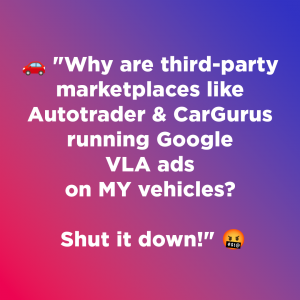- Mar 21, 2012
- 887
- 1,168
- Awards
- 9
- First Name
- Ryan

"Why are third-party platforms like Autotrader or CarGurus running Google VLA ads on MY vehicles? Shut it down!"
Sound familiar, car dealers?
Let's dissect this common concern with a sharper lens: What if allowing third-party marketplaces to run VLA ads on your inventory isn't a curse, but a veiled blessing?
Here's my take: If you've already maxed out your VLA budget, yet you're not capturing a full 100% impression share, why not be grateful that Autotrader, Cars.com, CarGurus, and CARFAX are helping fill the gap?
Because here’s the kicker: Your cars are still the ones reeling in the clicks. And guess what? You’re not footing an extra bill for it.
Pause and consider: If you tell these third-party marketplaces to hit the brakes on running VLA's for your vehicles, guess who benefits? That’s right, your competition. The same advertising budget will just veer towards showcasing their inventory instead; they certainly won't pass the savings along to you.
"But Ryan, my website converts WAY better than a third-party site."
That may be the case, but aren't some leads better than no leads? The answer is yes.
"But Ryan, third parties are inflating my cost-per-click!"
Does it, though? Real talk: VLA ad units have a carousel of 20 vehicle cards. The search keywords that trigger a VLA often have an army—sometimes hundreds or even thousands—of eligible vehicles, especially when you factor in geographic scope, the inventory availability of certain models, and nationwide VLA advertisers like Carvana.
So, pulling your cars out of the game won't really lower your CPC, unless every other dealer decides to collectively opt out.
And let's not forget: Google's recent shift to Performance Max is changing the game once again.
VLA's were originally a dynamic, VIN-specific ad format that could go toe-to-toe with Facebook’s Automotive Inventory Ads.
Now, Pmax is diluting VLAs by forcing dealers to also serve the ads on YouTube, Gmail, Discover, Display, and traditional Search.
Only time will tell how effective VLA's will remain.
So, dealers, let's not be too hasty asking third parties to stop promoting your vehicles.
Sometimes, what seems like a problem may actually be an opportunity.
Last edited:








